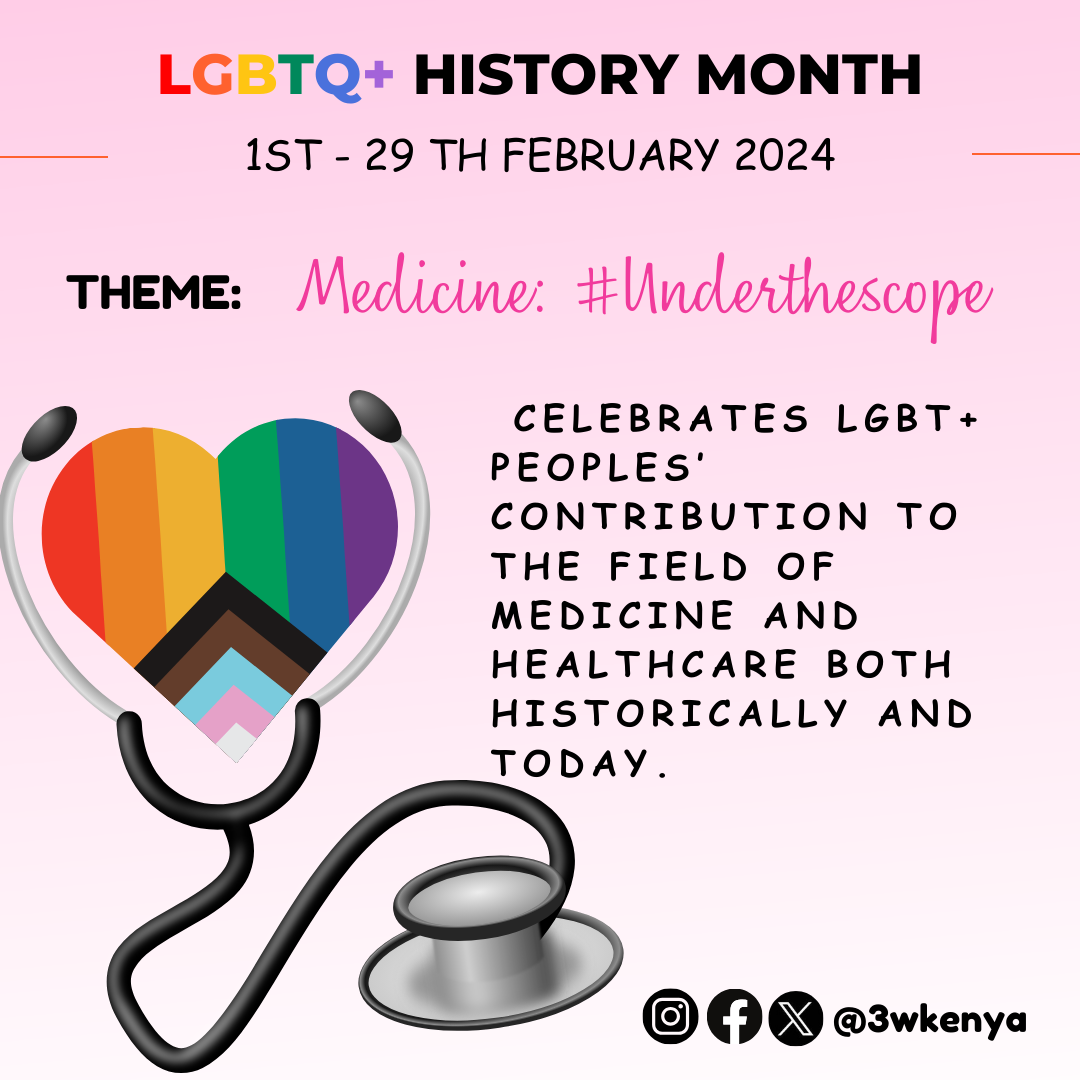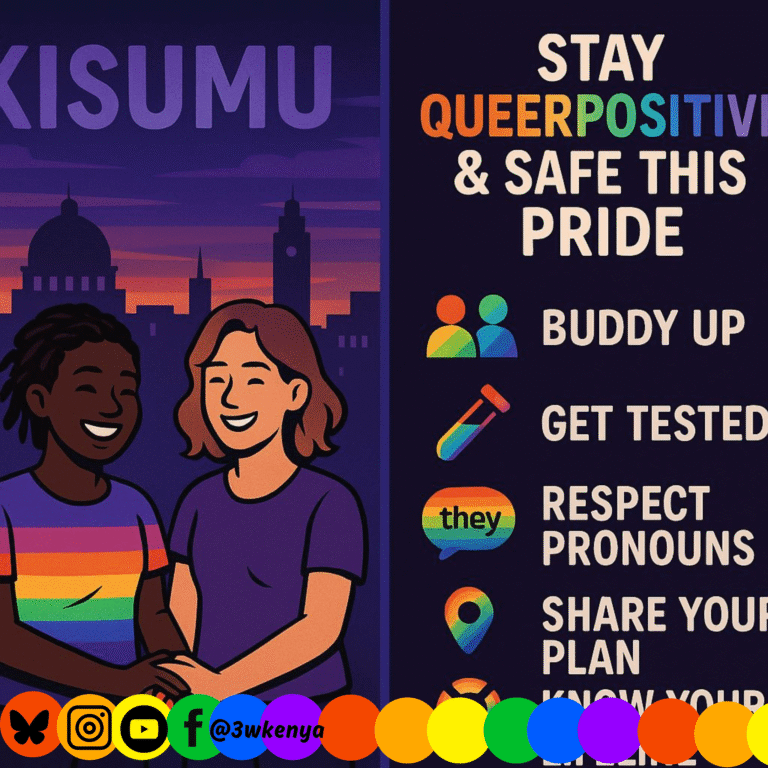Under the Scope: LGBTQ+ Healthcare Reality.
Hey there Pride family! ✨As we dive into the month of love, chocolates, and all things rainbow-colored, let’s take a moment to turn our attention to something that deserves a front-row seat in the spotlight – LGBTQ+ History Month. This year’s theme is “Medicine #Underthescope” But hold on, this isn’t just a global celebration; we’re bringing it home, making it as specific and relatable as that chapati recipe your grandwa swears by.
Why February Matters:

Picture this: February 2024, and we’re rolling out the red carpet for LGBTQ+ folks in the field of Medicine and Healthcare. From the groundbreaking strides in history to the unsung heroes navigating the complexities of today’s healthcare landscape, it’s a celebration that hits close to home. And by home, we mean Kenya, where the journey is less colorful.
Why Celebrate LGBTQ+ History Month?
Now, you might be wondering, “Why bother?” Well, besides the fact that it’s a dazzling month of love and visibility, it’s a chance to Claim our past, Celebrate our present, and Create our future. Founded in 2005, this commemoration is our megaphone, amplifying the voices that have been silenced for far too long.
But what’s behind the rainbow lens? It’s not just about parades and glitter; it’s about recognizing the incredible contributions of LGBTQ+ individuals in the healthcare sector. This isn’t just a global phenomenon; it’s our story too – a story of resilience and passion.
Listening to Our Own Stories:
The LBTQ+ community in Kisumu faces hurdles in accessing basic health rights. This is mostly due to the fact that they are judged harshly for not “conforming” to the societal “hegemony”. In various forums you will hear stories of struggles LBQT persons face in accessing health services. A queer woman narrated how she was asked
“bring the owner of the pregnancy”
before she could be offered a safe abortion service! This is a womxn who got pregnant as a result of rape. This insensitive remarks from a healthcare provider saw her walk out of the facility.
A big concern when LBQT persons try to get SRHR services is the fear of being outed to the larger homophobic community, worse for masculine-presenting womxn who have been harshly judged for not conforming to the standards of what femininity is and trans diverse persons who are on gender affirming care services, the risk of being exposed is pretty high.
This fear can/has led to reduced and poor uptake of health care services amongst the LGBTQ persons most especially LBQ persons who have a very limited pool of LBQ targeted health care service providers and facilities/clinics leading to an increase of new infections.
This has also contributed to physical health problems, further affecting mental well-being. It sets off this cycle of health issues that, if not dealt with, might even lead to death.
According to an article by Aljazeera (2022) revealed that many queer people in Kenya say they would rather try risky alternative treatments than suffer humiliation at public hospitals. Another study in the Journal of Sexually Transmitted Infections in 2022, revealed that LBQT women are three times more likely to

catch STIs as compared to their heterosexual counterparts. The paucity of research and participation of LBQT persons in HIV and abortion programming is evident not only in Kenya but globally. This has led to LBQ person institutionalized exclusion from HIV and abortion discourse contributing to LBQT persons further isolating themselves from health intervention programs because they are not inclusive to all.
Talk about a wake-up call! It’s like waving a flag screaming for personalized info and services to tackle this head-on.
These are a few instances that highlight the need to commemorate LGBTQ history month, to have a look outside the frame of how far we have come and some of the measures we are putting in place to secure a safer and more inclusive future.
But wait, there is a pot of gold at the end of this Rainbow!
Ongoing efforts focus on increasing visibility and creating awareness about the unique healthcare needs of LBQT women, fostering understanding and inclusivity within the healthcare sector.
1.Professional Training Programs:
Healthcare professionals are continually undergoing training to deliver culturally competent and sensitive care for LBQT individuals, contributing to a more supportive healthcare environment.
2.Legal Reforms in Progress:
Advocacy for changes in legislation to safeguard the rights of LBQT individuals, including anti-discrimination laws, is ongoing, with potential positive impacts on healthcare experiences.
3.Community-Driven Initiatives:
Community-based initiatives and support groups are emerging to provide LBQT women with essential resources, information, and a sense of belonging, contributing to improved health outcomes.
4.Collaboration with LGBTQ+ Organizations
Collaborative efforts between healthcare institutions and LGBTQ+ organizations are shaping tailored healthcare services and programs to address the unique needs of LBQT women, enhancing inclusivity and accessibility.
Our Medical Warriors
The struggle for safe, inclusive access to services like safe abortion without discrimination and sexual and reproductive health rights still rages on. But fret not, fam! We’ve got allies in our corner not just in Kisumu but Nationally.
They are standing tall, ready to offer support as we ride this wave, let’s not forget that our community still faces health inequalities. It’s like trying to find Wi-Fi in the middle of a national park – complicated and frustrating.
The struggle is real, and it’s happening now. A midst the chaos, there’s a call to action. Listen to the stories of our LGBTQ+ family. Understand the struggles, celebrate the triumphs. This isn’t just for LGBTQ+ folks; it’s for everyone – educators, businesses, scholars, researchers’ programmers, service providers, libraries, art galleries – because understanding and empathy knows no bounds.

Individual Healthcare Empowerment:
Now, let’s talk about something even more crucial – our individual health. Mental, physical, emotional – the trifecta we need to nurture. During this month of celebration, let’s not forget to take care of ourselves and each other. Be a beacon of support, a listening ear, and a shoulder to lean on. Mental health matters, physical health is non-negotiable, and emotional health? Well, that’s the secret sauce.
Here are a few ways you can care for yourself:
1.Build Supportive Connections:
Surround yourself with understanding and accepting individuals who form a strong support system.
2.Prioritize Mental Health:
Seek therapy or counseling to navigate mental health challenges and establish regular self-care rituals such as journaling, painting, social media, detoxing among others curated just for you.
3.Stay Physically Active:
Incorporate regular exercise and maintain a balanced, nutritious diet for overall physical well-being.
4.Connect with the Queer Community:
Engage with the LGBTQ+ community to foster a sense of belonging and share experiences.
5.Educate Yourself and Celebrate Achievements:
Stay informed about LGBTQ+ health issues, express yourself creatively, and celebrate personal achievements for a holistic approach to self-care.
Wrapping It Up in a Rainbow Bow.
So, as we deck ourselves out in rainbow hues, let’s remember the essence of LGBTQ+ History Month. It’s not just a celebration; it’s a proclamation.
A proclamation that our stories matter, our health matters, and damn it, our existence matters.
In the heart of Kenya, under the Kisumu sky, we’re claiming our past, celebrating our present, and crafting a future as vibrant as the rainbow that unites us all. Here’s to a February filled with love, resilience, and a whole lot of pride.
#LGBTQ+History-month #Underthescope #LoveIsOurLegacy #HealthCareInclusivity #piasisi



